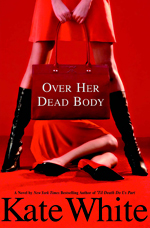Galley Girl: Yikes! The murder of a celebrity magazine editor. What inspired that?
Kate White: I've heard so many people — people on my staff, for instance, who have gone over to the celebrity magazines — talk about what a pressure cooker that world is, and how people yell, tempers flare. You hear at times that it can be a murderous environment. Those are places where people work until 4:00 in the morning. It's not just dealing with news — it's dealing with this crazy news that you're never sure is true. You're hurting people's reputations and you're making fun of them. So you're doing kind of bad things to them.
GG: Tell me about Bailey Weggins, your journalist-heroine. How would you describe her?
 A portrait of the author, Kate White
A portrait of the author, Kate White |
KW: I think of her as having, somewhat, the soul of an outsider. Though she's worked at magazines, and she started as a newspaper reporter, ultimately she has the heart of a freelancer. She's someone who has a bit of a cynical, irreverant take on a lot of what goes on around her, in terms of the magazine world.
GG: Is she based on you?
KW: I think she's based on the part of me that is an outsider, but because I've always been this company person, I've never really been able to play that cynic card. I wouldn't be so stupid as to do that!
GG: Would I be off track if I guessed that Mona Hodges, the celebrity editor, was inspired by your predecessor at Cosmo, Bonnie Fuller, who left to go to Us magazine?

|
KW: People have asked me whether it is based on this, or based on that, but of course you make your characters compilations. What I try to do is save up all the horror stories I hear about every diva in the world, and roll them into one.
GG: Are you intrigued by celebrities yourself?
KW: To a certain degree. I don't have the obsession with it, but at the same time, if I'm walking by a newsstand, and it says, "JUDE DID THE NANNY," I am going to stop and I am going to read. I can't deny it. I'm intrigued. When people ask me why these magazines are so successful, I think it's partly celebrities, but I also think it's a love of gossip. When we gossip about our friends, we feel guilty, we feel that this evil twin part of us was doing it. Afterwards, you have that hangover from having perhaps broken a confidence, or said something negative or tacky about a friend. When you're gossiping about Jude Law, you don't feel your karma's bad.
GG: How has the Cosmo girl changed since former editor Helen Gurley Brown's days?
KW: In a very major way, she has changed in terms of her confidence level. When Helen projected the image that used to be in ads back in the '60s and '70s of this really almost haughty-looking sophisticated woman, that was the fantasy in your mind, if you were a Cosmo reader, of how you were going to be. Let's face it: Back then, women weren't making that kind of money. They didn't have the same number of choices. The fact that they were in this position of ruling the world — it looked like they did in the ad — but of course they didn't. When I got the job, I knew that the ad campaign was Fun Fearless Female, but I assumed like a lot of good ad campaigns, it was more sizzle than steak. But when I got in and started reading the letters and emails from readers, I was blown away by how confident they are. They feel a very healthy sense of entitlement. They feel if they work hard enough, they can have anything they want. It's so refreshing. The only thing they struggle with today is they've got a lot of choices. What they worry about is making one choice, and regretting not making the other.
GG: How in the world do you find time to write books?
KW: That's the No. 1 question people ask me. I used to suffer from terminal procrastination back in my twenties. I read a couple of really great books on time management. With those books, I learned some strategies. Probably one of the best ones for me was one called Slice the Salami. The idea was that if you have a project, one of the biggest mistakes that people make is going about it in ways that are overwhelming. So, for instance, you say I'm going to write all day Saturday. When I would try to do that, it would just become so unappetizing. (The author's) point was that you slice it as small as it's going to take to make you do it. So when I started, I only allowed myself to write 15 minutes a day. It sounds so dumb and simple, that was it. Now my rule is to write for two hours on Saturday and Sunday. I never tell myself I'm going to do it more than that.
GG: Now that the women's magazines have gotten racier, how has that affected Cosmo? That was your traditional territory.
KW: Well, it's been interesting for me. You would think that as other magazines started to explore some of that, it might hurt us. But we are by far the newsstand leader now, in a bigger way than we've ever been. Our nearest competitor, Glamour, is now over a million copies less than us on the newsstand. Maybe it's just because it's so much part of our mission. Sometimes when you try to do something that really falls into somebody else's territory, it's very hard for them to own it.
GG: What is it? What is the essence of Cosmo?
KW: What we call ourselves is the bible for young single women who want to live large and love large. The reader wants candid sexual advice and relationship advice, and that's part of our trademark. But she also loves the over-the-top quality. So if Jay Leno isn't mocking it, or doing a spoof on it, or reading our coverlines — if he's not doing that regularly, maybe I've pulled back too much.
